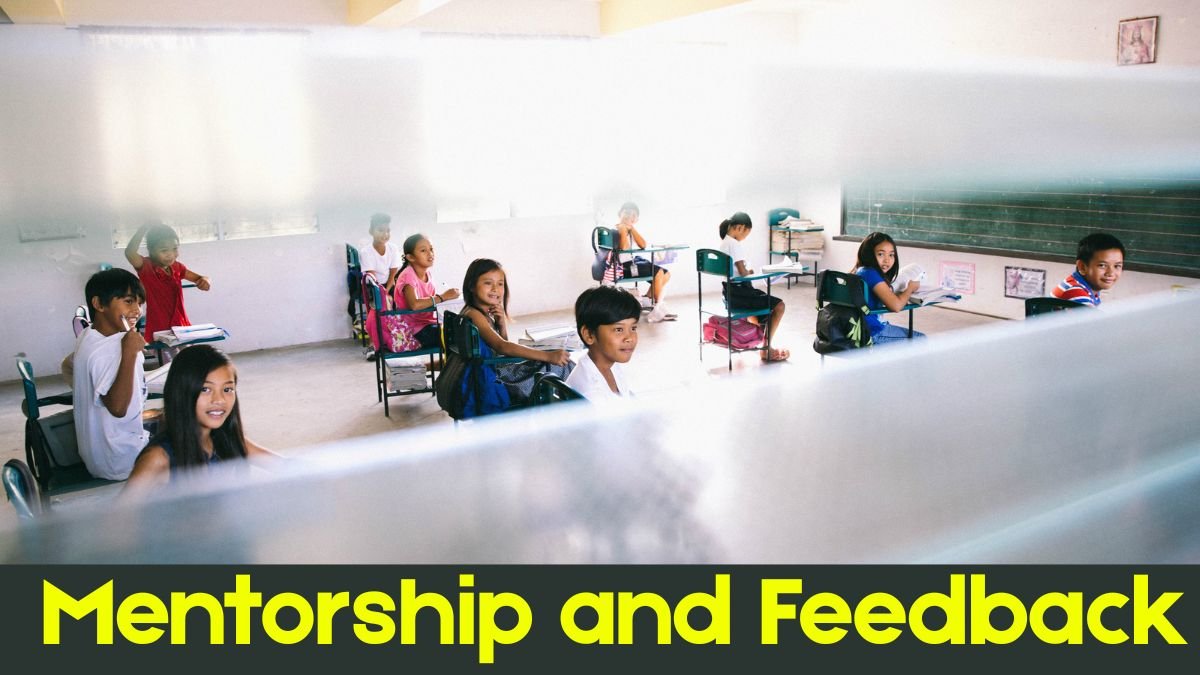The nature of education is rapidly changing. With the advent of technology, online platforms, and new teaching methodologies, teachers are now expected to not only impart knowledge but also support students’ intellectual, emotional, and professional development. In this context, mentorship and feedback have emerged as two crucial pillars of teaching excellence. These aspects help teachers perform their roles more effectively, build strong relationships with students, and guide them towards success. This article will explore in detail how mentorship and feedback enhance teaching in the modern classroom.
What is Mentorship and Why is it Important?
Mentorship means guidance from an experienced person. Education remains incomplete if teachers limit themselves to only imparting academic knowledge. A good mentor not only explains the curriculum but also instills confidence, motivation, goal-setting skills, and self-discipline in students.
Mentors understand students’ personal problems.
- They guide students about career options.
- They help students overcome stress, failure, and self-doubt.
- In today’s competitive environment, the need for such guidance is greater than ever.
Feedback: The First Step to Improvement
The purpose of feedback is not merely to point out mistakes, but to help students understand how they can improve their performance. Positive feedback boosts students’ morale, while constructive feedback gives them an opportunity to understand their weaknesses.
- Regular feedback makes the learning process smoother.
- Students learn to self-assess their performance.
- Teachers can also adapt their teaching style by understanding the needs of their students.
The Role of Mentorship in the Modern Classroom
Students in today’s classrooms come from diverse backgrounds. Some face language barriers, while others struggle with financial constraints. In such situations, a mentor provides support tailored to the student’s needs. Personalized guidance boosts students’ confidence.
- Mentors help explain difficult topics.
- They also discuss issues related to mental health.
- An effective mentor can unearth hidden talents in students.
How to make the feedback system effective?
- Feedback is effective when it is clear, honest, and timely.
- Interact with students and get their feedback.
- Appreciate efforts rather than focusing on failures.
- Encourage students for even small achievements.
Feedback should be personalized and include examples.
This increases students’ interest in learning and motivates them to improve their performance.
Impact of Mentorship and Feedback on Students’ Mental Health
Mental health is a major issue today. Many students struggle with stress, anxiety, and self-doubt. This aspect of mentorship and feedback provides emotional support.
- Students can openly discuss their problems.
- Self-esteem increases.
- Students develop the ability to remain calm even in difficult situations.
Teachers should communicate empathetically, keeping students’ mental well-being in mind.
Developing Leadership Skills through Mentorship and Feedback
- A good mentor helps students develop leadership qualities.
- Students gain the courage to make decisions.
- Teamwork and communication skills improve.
Students learn to find solutions to problems.
Feedback helps them understand that leadership is not just about giving orders, but also about helping others.
How to Enhance Mentorship and Feedback with Technology?
Online platforms and digital tools have made communication between teachers and students easier.
- Personalized mentorship is possible through video calls.
- Feedback can be collected through online forms and apps.
- Teachers can easily monitor students’ progress.
Effective use of digital tools can make mentorship and feedback more impactful.
How Mentorship Provides Career Guidance?
Students are often confused about their career path. A mentor can guide students in the right direction based on their skills, interests, and opportunities.
- They introduce students to new career options.
- They encourage participation in internships, research projects, and competitions.
- They teach job-relevant skills.
This helps students become self-reliant and pave the way for career success.
Developing a Habit of Self-Reflection through Feedback
When students accept feedback with an open mind, they begin to learn from their mistakes.
- They view mistakes as learning opportunities.
- They adopt a continuous improvement process.
- They learn to self-evaluate.
This habit helps them succeed in all areas of life.
The Importance of Mentorship and Feedback for Teachers
- Mentorship and feedback are important not only for students but also for teachers.
- Teachers’ communication skills and empathy improve.
- They can innovate their teaching style.
They establish a trusting relationship with students.
This transforms teachers into not only subject matter experts but also inspiring mentors.
Conclusion
Excellence in teaching in the modern classroom does not solely depend on imparting subject knowledge. An effective teacher is one who takes care of students’ personality development, mental well-being, career aspirations, and self-confidence.They should provide guidance and mentorship. Both mentorship and feedback make the teaching process more human, supportive, and effective. Today’s students need not only knowledge, but also mental, emotional, and professional support to navigate life’s challenges. In this context, the role of teachers becomes that of mentors and guides. If we embrace these two aspects, the quality of education will not only improve, but students will also become self-reliant, empathetic, and capable leaders. This is the true essence of excellence in teaching.
